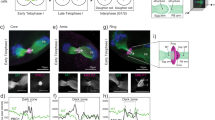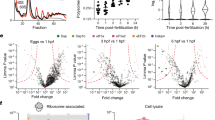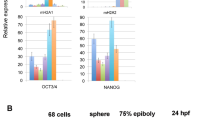Abstract
During the early stages of embryogenesis, the sea urchin embryo uses maternally synthesized mRNA stored in the egg as inactive messenger ribonucleoproteins (mRNPs)1. Release of this mRNA for translation allows the embryo to develop even in the absence of new mRNA synthesis. Comparison using two-dimensional gel electrophoresis shows that the same spectrum of prevalent proteins are synthesized by eggs and zygotes 30–60 min after fertilization2. Thus, unlike the case of the clam Spisula in which there are several prominent changes in translation associated with fertilization3, sea urchins have been thought to show little or no regulation of translation of specific mRNA sequences. Histone mRNAs are major components of the mRNA pool, comprising as much as 4–8% of the total mRNA of eggs4, yet their products, histones, would not normally be detectable on two-dimensional gels. We report here that mRNA complementary to a histone H3 cloned probe remains in the inactive mRNA pool for 90 min after fertilization before it begins to be translated. This is long after the rapid increase in overall protein synthesis, using stored mRNAs, has begun. As we can demonstrate no significant synthesis of histone H3 mRNA during this period, stored histone H3 mRNA must be subject to sequence-specific translational regulation.
This is a preview of subscription content, access via your institution
Access options
Subscribe to this journal
Receive 51 print issues and online access
$199.00 per year
only $3.90 per issue
Buy this article
- Purchase on Springer Link
- Instant access to full article PDF
Prices may be subject to local taxes which are calculated during checkout
Similar content being viewed by others
References
Raff, R. A. in Cell Biology. A Comprehensive Treatise Vol 5, 107–136 (Academic, 1980).
Brandhorst, B. Devl Biol. 52, 310–317 (1976).
Rosenthal, E. T., Hunt, T. & Ruderman, J. V. Cell 20, 487–494 (1980).
Davidson, E. H. Gene Activity in Early Development, 2nd edn (Academic. New York, 1976).
Raff, R. A., Brandis, J. W., Huffman, C. J., Koch, A. L. & Leister, D. E. Devl Biol. (in the press).
Dolecki, G. J., Duncan, R. F. & Humphreys, T. Cell 11, 339–344 (1977).
Winkler, M. & Steinhardt, R. Devl Biol. (in the press).
Jenkins, N. A., Kaumeyer, J. F., Young, E. M. & Raff, R. A. Devl Biol. 63, 279–298 (1978).
Woods, D. E. & Fitschen, W. Cell Diff. 7, 103–114 (1978).
Wold, B. J., Klein, W. H., Hough-Evans, B. R., Britten, R. J. & Davidson, E. H. Cell 14, 941–950 (1978).
Laskey, R. A. & Mills, A. D. Eur. J. Biochem. 56, 335–341 (1975).
Author information
Authors and Affiliations
Rights and permissions
About this article
Cite this article
Wells, D., Showman, R., Klein, W. et al. Delayed recruitment of maternal histone H3 mRNA in sea urchin embryos. Nature 292, 477–478 (1981). https://doi.org/10.1038/292477a0
Received:
Accepted:
Issue Date:
DOI: https://doi.org/10.1038/292477a0
This article is cited by
-
Structural analysis of the uEGF gene in the sea urchinStrongylocentrotus purpuratus reveals more similarity to vertebrate than to invertebrate genes with EGF-like repeats
Journal of Molecular Evolution (1989)
-
Maternal stores of α subtype histone mRNAs are not required for normal early development of sea urchin embryos
Roux’s Archives of Developmental Biology (1986)
-
Origin of a gene regulatory mechanism in the evolution of echinoderms
Nature (1984)
Comments
By submitting a comment you agree to abide by our Terms and Community Guidelines. If you find something abusive or that does not comply with our terms or guidelines please flag it as inappropriate.



